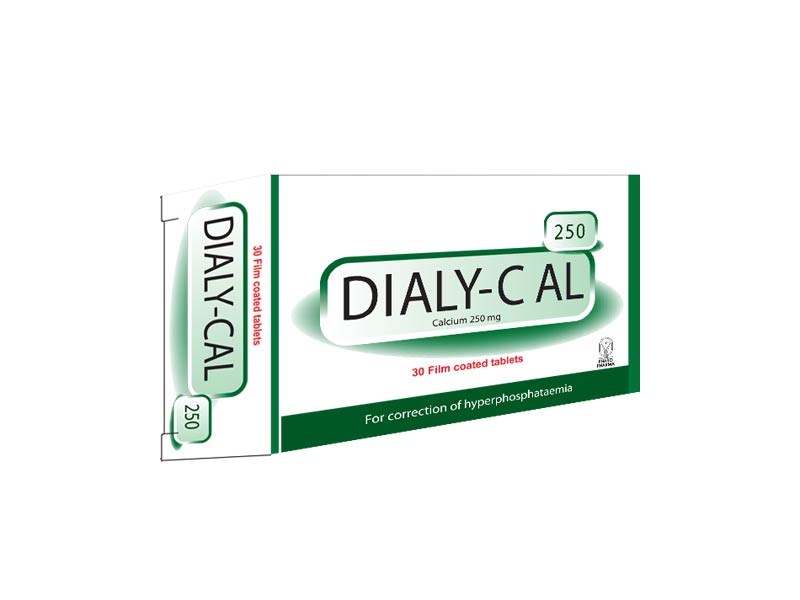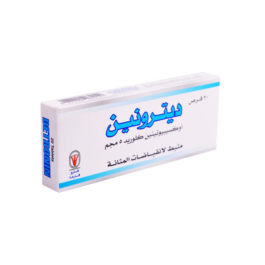Description
Pharmacological action:
Phosphate binder.
Calcium ions of calcium acetate interact with and bind to phosphates in the gastro-intestinal tract to form calcium phosphate an insoluble or partially soluble product, which is excreted in the faeces.
Both components of Dialy-Cal 250, calcium and acetate, are normal physiological components of the body and are also present in food. As a naturally occurring food constituent, calcium acetate is generally regarded as safe. However, excessive intake of calcium salts can result in hypercalcaemia.
Pharmacokinetics:
Calcium acetate is not indicated for systemic availability. The residual acetate will be metabolised through bicarbonate, which will be further excreted via normal metabolic routes.
The amount of calcium not involved in the binding of phosphate is variable and any unbound calcium may be absorbed. Therefore regular monitoring of calcium levels is recommended.
Indications:
Correction of hyperphosphataemia associated with chronic renal failure in patients undergoing dialysis.
DOSAGE AND ADMINISTRATION:
Initially one tablet 3 times a day. The tablet should be swallowed whole with a meal to achieve the maximal phosphate binding effect. Do not chew. The dose can be increased until the desired serum phosphate level is achieved, as long as hypercalcaemia does not occur. Most patients need 4 to 6 tablets per day (1 to 2 tablets with each meal).
The maximum recommended daily dose is 12 tablets.
Contraindications:
Hypersensitivity to the active substance or to any of the excipients. Hypercalcaemia.
ADVERSE REACTIONS:
Uncommon (0.1% – 1%) Undesirable effects are nausea, vomiting, diarrhoea and constipation.
Hypercalcaemia can occur and the serum levels of total and ionised calcium should be monitored. Mild hypercalcaemia (Ca>2.6 mmol/L) may occur in about 1% of patients and may be asymptomatic or manifest itself as constipation, anorexia, nausea and vomiting. More severe hypercalcaemia (Ca> 3.0 mmol/L) may occur in about 0.1% of patients and can be associated with confusion, delirium, stupor and in very severe cases coma. Patients should be advised to consult their doctor if any of these symptoms occur.
Drug Interactions:
Calcium interacts with several drugs:
– The absorption of antibiotics such as ciprofloxacin, enoxacin, norfloxacin, tetracyclines (PO) can be affected and consequently, the intake of Dialy-Cal 250 should be made 3 hours before or after the antimicrobial treatment.
– Vitamin D preparations may require dosage modification to avoid hypercalcaemia.
– Digitalis glycosides, verapamil and gallopamil in the presence of hypercalcaemia can enhance cardiac effects and can lead to cardiac toxicity. Therefore, special precautions for use (ECG and biological surveillance) are to be taken.
WARNINGS & PRECAUTIONS:
The use of phosphate binders in renal failure should be in conjunction with dietary advice regarding phosphate intake and methods of dialysis appropriate to the patient.
The dose will need to be adjusted depending on phosphate intake or removal by dialysis and on the ensuing effect on serum calcium. This requires regular monitoring, for example weekly, of both the serum phosphate and calcium levels to determine efficacy and prevent hypercalcaemia.
If hypercalcaemia occurs, the dosage should be reduced or the treatment withdrawn temporarily, depending on the degree of hypercalcaemia. The risk of hypercalcaemia needs to be considered particularly during concomitant treatment with Vitamin D preparations.
The concomitant administration of calcium and vitamin D derivatives is to be made under the supervision of a physician.
Patients suffering with progressive renal failure may exhibit signs of, and should be warned of the symptoms of, hypercalcaemia, ectopic or vascular calcification, or adynamic bone disease. Regular monitoring is required since caution is needed in administering Dialy-Cal 250 under these circumstances.
The long-term toxicity of Dialy-Cal 250 has not been evaluated in clinical trials. In particular during long-term phosphate binding therapy with calcium salts there have been reports of tissue calcifications. It is not known whether the risk of calcification is higher with Dialy-Cal 250 than with other calcium salts.
Patients should be advised to seek medical advice before taking non-prescription antacids containing calcium carbonate or other calcium salts to avoid adding to the calcium load.
Pregnancy & lactation:
Dialy-Cal 250 should only be administered to pregnant or lactating women if it is clearly indicated.
Effects on ability to drive machines:
No effects on the ability to drive and use machines have been observed.
overdose:
Overdose with calcium substances may lead to soft tissue calcifications.
Storage:
Keep at a temperature not exceeding 30C in dry place.
Keep out of reach of children.
Package:
A carton box containing 30 tablets in 3 transparent PVC/Al strips with a pamphlet.









Reviews
There are no reviews yet.